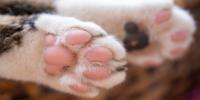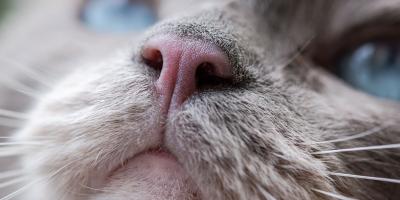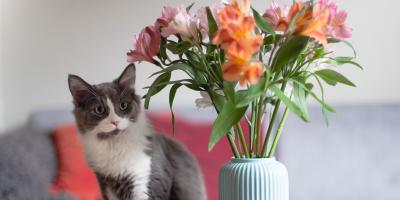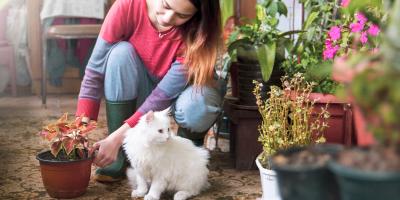Domestic cats are often known for being cool, aloof little creatures that are heavy sunbathers. But do cats sweat, perspire, or fluster? Yes, cats sweat, but cats don’t sweat like humans. Cats’ sweat glands, except for their paws, are covered mainly by fur, except for their paws.
Our experts cover various topics related to cat sweating, including whether cats can sweat, how they sweat, and where their sweat comes from. Learn why cats sweat and pant, and ways to reduce cat sweating and prevent overheating. Lastly, we’ll provide tips on how to keep cats cool during the hot summer months.
Can Cats Sweat?
Can a cat sweat? Yes, cats perspire, but where do cats sweat from? You may only notice their sweat through their paws. Sweating alone for cats doesn’t work the same as it does for humans. So, how do cats cool themselves? They have various other ways to cool off, including:
- Bathing Themselves: When cats bathe themselves, their saliva cools them down as it evaporates, which, to them, feels like getting in and out of a lukewarm swimming pool on a hot day does for humans
- Cool Surfaces: Cats will sprawl on cool-feeling surfaces like tile flooring or an empty bathtub
- Shedding: Cats often shed more than usual when it’s hot outside. Brushing your cat can help with that process and provide some bonding with your cat
- Panting: If your cat is overheated, they’ll begin panting. Panting causes heat to escape the body through the evaporation of saliva
How Cats Sweat and Where Cat Sweat Comes From
How do cats sweat? Since cats sweat through their paws, if they leave damp footprints behind, that’s how you’d know they’re hot.
Do cats have sweat glands? Yes. To regulate body temperature, they sweat through their paws, which includes their eccrine glands.
Cat Eccrine Glands
How do cats sweat through their paws? The eccrine sweat glands are in hairless areas of cats, such as their paw pads, between their toes, lips, and noses.
Why Do Cats Sweat and Pant?
But then you might ask yourself, Why is my cat sweating AND panting?
Suppose you find yourself in this situation, wondering, Why do cats pant? In that case, your cat might suffer from heat exhaustion or heatstroke. Cats typically don’t pant as dogs do.
Cat Heat Exhaustion or Heatstroke
What temperatures are cats comfortable in? Cats may be comfortable in temperatures up to 100 degrees Fahrenheit. Usually, what is a normal cat temperature for their body is about 101 degrees. At 104 degrees, a cat may suffer from heatstroke. Signs of cat overheating may include:
- A cat sweating excessively
- Panting
- Disorientation
- Seizures
- Shaking
- Excessive drooling
- Diarrhea
- Vomiting
- Bright red tongue, gums, or other parts of the mouth
If you notice your cat showing any of these signs, immediately move them to a cooler environment and call your veterinarian.
Anxious Sweating for Cats
Do cats sweat when stressed? Yes, feline sweat and panting can happen when stressed. Various stressors, such as a new environment, may cause this. If a cat is sweating and panting due to anxiety, it has encountered a severe stressor. Panting that does not stop upon removing the stressor should be considered an emergency veterinary visit.
How to Reduce Cat Sweating and Prevent Overheating
The good news is that cats don’t often suffer from heatstroke, at least as much as dogs might. Why? Cats aren’t typically known to go outside for intense exercise or play as much as dogs do. Regardless, cats still can just as well suffer from heatstroke. Consider the following cat-oriented scenarios:
- Jumping into a clothes washer or dryer and getting trapped
- Exploring an outdoor shed without air conditioning, and the door closes behind them
- A stray or runaway cat finding themselves without shade or water
- Bringing a cat in the car for a veterinary checkup, and then the cat is left in the car for a “quick” errand
- Never leave your cat in a car
If your cat’s paws are already wet, you must take the proper steps to prevent overheating.
- First, for optimal prevention, it’s best to shepherd them out of the heat, if possible
- That means in a well-ventilated, climate-controlled environment
- Allow them ample shade and help them avoid hot pavement
- Wet the cat’s fur if you can get a damp, cold cloth
- Give them cool water to drink. It wouldn’t hurt to add an ice cube if available. Hydration is key
Cat Hydration
Keeping your cat hydrated is essential to keeping them cool. Offer your cat fresh water to drink. Wet cat food can also provide extra hydration. If your cat is being picky about drinking the water it needs to avoid overheating, try giving them the easy-to-feed Hydra Care supplement by Purina Pro Plan Veterinary Supplements, which has been shown to promote hydration in cats.
If your cat is dehydrated, signs may include:
- Elevated heart rate
- Skin tenting
- “Skin tenting” is a phrase for decreased skin elasticity in cats. Try gently pinching your cat’s skin over its shoulders and releasing it. If it stays in place, your cat is dehydrated.
- Dry gums
- Lethargy
- Depression
- Loss of appetite
Any of the above signs warrant an immediate call to your veterinarian. They can help your cat recover from overheating.
The following cats are more likely to experience overheating or heatstroke compared to other cats:
- Nursing and pregnant cats
- Senior or young cats
- Cats suffering from pre-existing conditions such as heart or lung disease
- Obese cats
- Brachycephalic cat breeds, such as:
How to Keep Outdoor Cats Cool in the Summer
If you find yourself frantically searching online for “how to cool down cat in summer,” you’ve come to the right place. It may be easier than it seems. Keeping cats cool in summer heat varies depending on their environment. While indoor cats may cool off on freshly mopped tiles, keeping outdoor cats cool in summer involves more creativity. For example, you might find an outdoor cat crawling into some dirt under a shady bush. Some easy ways to help an outdoor cat sweating in the summer may include:
- Always keeping fresh water easily accessible
- Hot tip: Put ice cubes in a bowl and let cats play with them
- Double-checking sheds or garages for cats, as those environments may have poor air circulation
- Providing shade
For more expert tips on cat skin, explore our other cat skin and ear health articles.

Earn myPurina Rewards with Every Purchase
Use your points for treats, toys, and gift cards with myPurina app.




